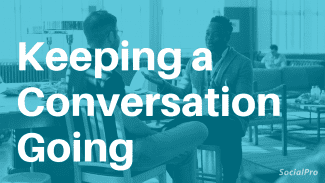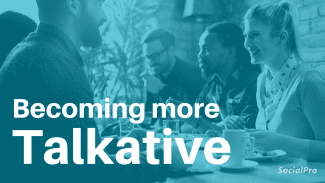Most people avoid difficult conversations and sensitive topics because of an underlying fear of confrontation and conflict. While conflict is often uncomfortable, emotionally draining, and even scary, conflict avoidance usually isn’t healthy for your relationships.[1][2]
This is true for workplace conflicts as well as conflicts in your personal relationships, where small issues can snowball into larger ones when they’re avoided.[3] Also, it isn’t possible to avoid uncomfortable conversations or conflicts, which is why everyone needs to develop the social skills to navigate them.[3]
This article will provide examples of hard but necessary conversations you may need to have at work or in your personal life. It will also give you skills to help you navigate them successfully.
Sections
- Why avoiding difficult conversations doesn’t work
- How to have difficult conversations
- Difficult conversation topics
Why avoiding difficult conversations doesn’t work
The majority of people try to avoid difficult conversations, but this is usually an ineffective strategy. Many difficult conversations and conflicts are unavoidable. This is true for personal relationships and also professional ones as well. According to a large survey in the UK, 51% of workers reported having to have difficult conversations at work at least once a month or more.[4]
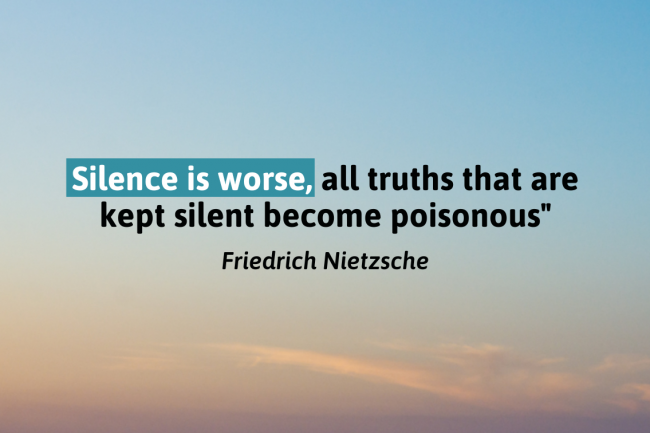
While most people avoid conflict to protect their relationships, research has shown that conflict avoidance actually undermines the strength and quality of a relationship.[1][2][6] People who avoid initiating or having difficult conversations with people in either their personal or professional lives often report:[1][3]
- Important issues and problems do not get solved
- Unaddressed issues become bigger over time
- Relationships become more fragile
- People are unable to be genuine and authentic
- More stress is created by avoiding difficult conversations
- Emotions become suppressed and build up over time
- Relationship satisfaction goes down
- Big fights can erupt, even around ‘small’ issues
- Resentment and anger can build after appeasing for too long
- Productivity, teamwork, and work satisfaction go down
You might find this article on improving conversation in a relationship helpful.
When is it OK to avoid a difficult conversation?
There are some exceptions to the rule that avoidance is not a healthy or effective strategy when it comes to difficult conversations. One exception is when the issue or topic is one that is minor or will resolve itself on its own.[3]
For example, it may not be necessary to confront a coworker or supervisor about their lack of effort if you’ve just turned in your two-week notice and are changing jobs. The times when it’s crucial to initiate a difficult conversation are situations where:[3]
- There is something of importance at stake
- There are specific ways a person can help resolve an issue or problem
- Avoiding the conversation is causing or could cause bigger problems
- A negative pattern has developed that is unlikely to stop unless addressed
How to have difficult conversations
The way you approach and navigate a difficult or crucial conversation is incredibly important. Being too passive in a conversation can cause you to be overly accommodating, putting your feelings and needs last. Being too aggressive in a difficult conversation can cause the other person to shut down and become defensive while also damaging your relationship with them. Communicating assertively is key when approaching conflicts, confrontations, and other difficult conversations.
Below are 15 tips and strategies to help you know how to have difficult conversations at work or with your partner, friends, or family.
1. Understand the underlying issue
Before you initiate a difficult conversation, do some self-reflection to make sure you really understand the issue. This means taking time to think about the issue or problem from multiple perspectives.[3] It also means identifying any underlying issues that might be causing or contributing to the problem or issue.[6]
Example: It might bother you when your roommate has friends over on a weeknight because it makes it hard for you to get a good night’s sleep. However, if you never had a conversation with them early on about this, it’s unfair to assume they would know this is something that bothers you. In this case, the underlying issue is related to a lack of communication about house rules and expectations.
2. Identify an achievable goal for the conversation
All difficult conversations should be organized around a clear “goal” or objective you’d like to achieve. Identifying this goal beforehand is really important, and it’s also a good idea to make sure the goal is something within your control. When you have a clear goal that’s within your control, it’s almost always possible to accomplish it, no matter how tough the conversation is. If your goal is something not within your control, try to shift it to one that is.[6]
More examples of goals that are not within your control and ones that are:[6]
| Goals not within your control | Goals within your control |
| Getting someone to agree with you | Expressing your views clearly |
| Making someone change their behavior | Sharing concerns about their behavior |
| Not hurting someone’s feelings | Being respectful at all times |
| Not having things escalate into conflict | Setting the tone for calm conversation |
| Getting a specific response you want | Asking for things you want or need |
3. Set up a good time and place to talk
Timing is key when it comes to hard conversations, but so is the location where you have the discussion. The more difficult or sensitive the topic of conversation is, the more important it becomes to choose the right time and place to talk. It’s usually a good idea to ask the other person about times and places they prefer, or at least to keep this in mind when making recommendations.
Choosing a “neutral” place for a difficult conversation is more likely to yield a positive outcome.[3] This might mean choosing a public place to talk instead of having a conversation at an apartment or personal office. Just make sure that the place you select is one where you can expect to have some privacy. Also, make sure to schedule enough time to have an in-depth conversation, rather than trying to have a rushed conversation on a 15 or 30-minute break.
4. Give advance notice about the topic
When there’s a really sensitive and difficult topic you need to discuss with someone, it’s best not to blindside them. Giving advance notice is more likely to lead to a positive outcome than bringing a surprise bomb to what someone else thinks is a friendly or casual lunch date.
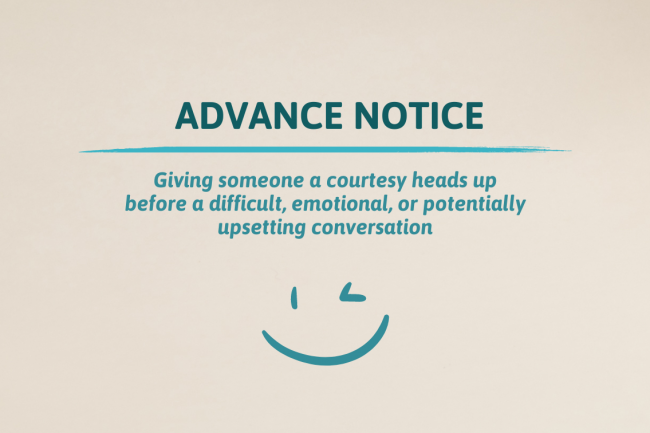
When you’re working to set a time and date to talk, give them a heads up about what you would like to discuss. This way, they have some time to think and reflect on the issue beforehand, time to consider your request, run it by higher-ups, and possibly be able to give you a definitive answer in the meeting.
Example: If you want to have a discussion with your boss about getting a raise or a promotion, let them know what you’d like to discuss when setting up the meeting.
5. Prepare without scripting
Doing some preparation for a difficult conversation can help you organize your thoughts, but too much prep can backfire. For example, scripting and rehearsing conversations ahead of time can cause your mind to go blank when things don’t go exactly according to plan. A better way of preparing for a hard conversation is to create a mental outline with a few important points you want to communicate.
Example: If you are planning on addressing a relationship problem with your partner, you may want to prepare by:
- Identifying the core problem you want to address (e.g., lack of communication or commitment or something they did or said that hurt you).
- Identifying the way it affects you, your life, and your relationship (e.g., makes you feel unimportant, creates more uncertainty, or makes it hard to plan for the future).
- Identifying what you want or need from the other person (e.g., to hear what they want and envision for the future of the relationship or an apology, commitment, etc.).
6. Imagine a positive outcome
When you find yourself dreading a certain conversation, it’s almost always because you’ve imagined having it go poorly and are now expecting it to go this way. Imagining a positive outcome means you’re less likely to feel stressed and anxious about the conversation and also less likely to approach the conversation defensively. This is why imagining a positive outcome actually makes one more likely to occur.
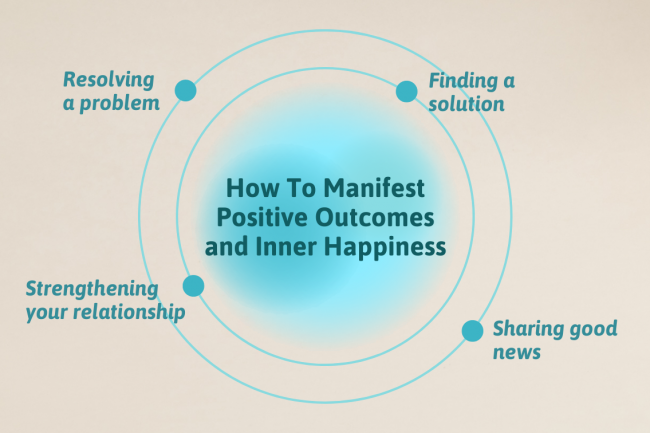
Example: If a friend tells you, “We need to talk,” try not to let your mind wander to all of the worst possible outcomes. Instead, consider other, more positive things they may want to talk about, like good news they have to share or something exciting they want to do with you.
7. Initiate the conversation and be direct
When the time comes to have the conversation, do not delay too long by avoiding small talk. Getting the difficult issue or topic on the table early on in the interaction can reduce tension and anxiety while also giving everyone more time to dedicate to the issue at hand.
One of the best ways to initiate a difficult or touchy conversation is to use an I-statement, which includes the problem from your perspective. I-statements are less likely to trigger defensive responses and can also help you to express yourself.
Examples of I-statements:
- “I’m feeling frustrated at work because there are so many meetings that it’s hard to get my work done, and I would love your help finding a way to cut a few of these out.”
- “I’m concerned about how much you’re drinking and feel like it’s affecting the quality of our time together. I’d really like it if you didn’t drink as much when we’re together.”
- “I’ve been feeling less happy in our relationship. While we’ve done some things to improve it, I think we really need help from a couples’ therapist.”
8. Be tactful when confronting someone
When a confrontation is necessary, it’s best to stay focused on the behavior during the conversation instead of the person. For example, it’s OK to talk with a parent or family member about their drinking problem, but don’t resort to calling them an “alcoholic” or “addict.” This way, they’re a lot less likely to be defensive with you and more likely to actually hear and receive what you have to say.
Examples of tools and tips for being tactful when confronting someone about their behavior:
- Confronting an employee about their performance by saying something like, “I have noticed that you’ve been absent from a lot of meetings and turning things in late, which isn’t like you. Is everything OK?”
- Starting a difficult conversation with a friend about their drinking by saying something like, “I’m just really worried about you” or “I really care about you.”
9. Listen with an open mind
Difficult conversations shouldn’t only involve one person talking, so make sure to be intentional about pausing and asking questions to get the other person’s input. Also, try to keep an open mind and be willing to consider their perspective instead of being so firmly stuck in your opinion that you disregard anything they have to say.[6]
Examples of ways of being a good listener with an open mind, even when you have strong feelings or opinions:[6]
- Approach each difficult conversation with a curious mindset, which reminds you to keep an open mind and avoid jumping to conclusions.
- Allow yourself to take the perspective of the other person and really try to imagine their thoughts, feelings, and experiences.
- Assume that most people have good intentions (unless you have clear proof that this isn’t true), which helps you remain open and non-defensive.
10. Remain non-defensive
Defensiveness is one of the most common reasons why tough conversations turn into conflicts and arguments. When people feel hurt, offended, or threatened, their first instinct is almost always to get defensive. Some people shut down. Others make snide comments or become sarcastic or passive-aggressive. Others use blame or guilt, and some people just start yelling and shouting.
What all of these defenses have in common is that each one of them works to shut down healthy communication.[6] You can’t control how other people respond, but remaining non-defensive is usually the best way to avoid a heated argument. This can even break the cycle of defensiveness and make it possible to have a more positive and productive conversation.
Examples of defensive responses to avoid:
- Raising your voice or yelling
- Interrupting or talking over the other person
- Resorting to personal attacks or blame games
- Dredging up the past or unrelated issues
- Letting yourself be pulled into an off-topic argument
- Feeling the need to defend or counter each attack
- Suggest taking a break if things remain too heated
You might also find this article on how to express emotions healthily helpful.
11. Know when to compromise (and when not to)
Not all difficult conversations will have an ideal ending, no matter how skillfully you approach them. Sometimes, the best outcome will be a compromise that requires you and the other person or people to sacrifice a little of what you want to meet in the middle. Other times, it’s not always healthy to compromise on things that really matter to you, including your values, dreams, and ethical code.
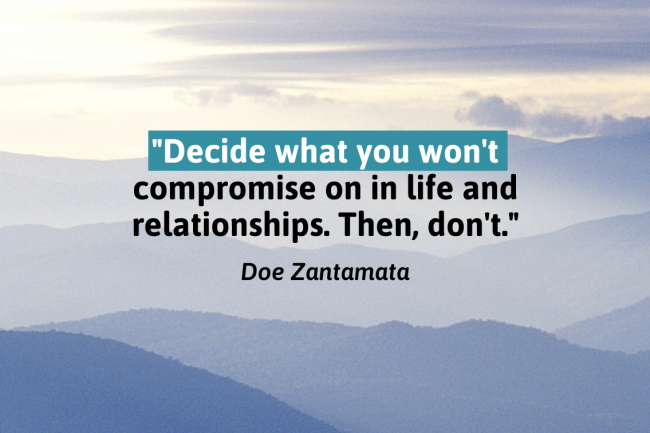
Examples of how to know when to compromise and when to stick to your principles:
- Ask yourself if compromising would go against your ethics or values.
- Consider what you’re sacrificing, giving up, or losing in the compromise.
- Consider whether the compromise is fair and equal (meeting in the middle).
- Identify what is gained by you and the other person in the compromise.
- Weigh the pros and cons of the compromise before deciding.
12. Look for a common goal
In even the most difficult conversations, there are often certain points that you and the other person can both agree on. A common goal unites you because it means you and the other party want the same outcome and just need to find an acceptable path to get there. When there is a common goal, it becomes much easier to focus on solutions rather than just the problems.[6]
Examples of how to find a common goal:
- Start by stating what you would like to get from the conversation. E.g., “I am hoping we can work through this and continue to have a strong relationship.”
- Ask what the other person wants from the conversation by saying, “What do you think would be the ideal outcome?”
- Avoid letting differences become barriers by saying things like, “I think we both agree that ____” or “While it seems like we’re on different pages, it sounds like we both would like ____”
13. Have a follow-up conversation
Many people make the mistake of viewing hard conversations as a “one-and-done” deal when they may need to occur as a series. For example, it’s not realistic to expect that years’ worth of relationship damage or trust issues with a friend could be resolved in one conversation. Often, follow-up conversations need to occur, but they tend to be less intense and more productive than the initial conversation was.
Examples of follow-up conversations:
- Calling your parents after a heated argument to apologize for certain things you said that hurt the relationship.
- Following up with a roommate after confronting them about their messiness by saying something like, “I really appreciate that you’ve been making more of an effort to clean up.”
- Letting a friend know that there are no hard feelings after having a difficult conversation about something they said or did that upset you.
14. Address issues when they are still small
One of the reasons many people avoid difficult conversations is because they’ve avoided addressing issues when they’re still small. When ignored issues get bigger over time, they become harder to resolve and more anxiety-provoking. This is why it’s best not to delay having a difficult conversation early on when a problem first arises.
Examples of how to address small issues early on:
- Be more expressive and open about your feelings and opinions, rather than keeping them to yourself when you disagree or don’t like something that’s said or done.
- Bring small issues up in a casual way rather than treating them like they’re all serious by saying something like, “Hey can we chat real quick?” or “I just wanted to say…”
- Use questions instead of statements or accusations when there’s an issue, like asking, “Would it be possible to ___?” or, “Would you mind ___ next time?”
15. Know how and when to leave a dead-end conversation
Not all conversations will be productive and positive, no matter how much you work on your approach. There will be times when the other person is too immature or defensive, or you’re too emotional, and also times when there just isn’t a solution to the problem. Knowing when and how to end a conversation is just as essential as knowing how to initiate one.
It’s a good idea to end a conversation when things have become too heated or when one or both people begin attacking each other. It’s also best to end a conversation that’s going in circles with no resolution in sight. Continuing past this point is more likely to result in more conflict instead of a solution.[6]
Examples of how to stop a dead-end conversation:
- “I think we’re both a little too heated. Let’s stop before we take things too far or say things we can’t take back.”
- “I don’t think this is going anywhere productive. Let’s agree to disagree for now and maybe try to talk about this again later.”
- “I want to have this discussion, but I think we both need more time to think and reflect in order for it to be healthy and productive.”
Difficult conversation topics
What counts as a difficult conversation is a little different for each person, but they almost always involve sensitive or uncomfortable issues. These are issues that have the potential to cause conflict, hurt feelings, or lead to misunderstandings.[1][2]
Some difficult conversations have the potential to change, damage, or even end a friendship or relationship. At work, difficult conversations often involve giving or receiving negative feedback or discussing touchy subjects like salary or inappropriate behaviors.[4][5]
Below are examples of the most common difficult conversations that people dread having at work and in their personal lives:[1][2][4][5]
| Difficult work conversations | Difficult personal conversations |
| Discussing or negotiating pay or asking for a raise | Controversial topics, including religion and politics |
| Holding someone at work accountable for work they didn’t do or did poorly | Discussions about money or personal finances |
| Talking to a supervisor about a problem with another coworker | Discussions about sex and intimacy in relationships |
| Dealing with a coworker who has a difficult personality | Discussions about the past, particularly painful events or experiences |
| Discussing plans to quit or look for another job | Discussing romantic or sexual relationships |
| Giving or receiving critical or negative feedback at work | Talking about personal problems or issues that are difficult and emotional |
| Asking for a favor or being asked for a favor at work | Setting boundaries or saying things that are honest but may offend someone |
| Sharing an unpopular opinion or idea at work | The current or future status of certain relationships (e.g., romantic/sexual) |
| Discussing or addressing inappropriate workplace behavior | Discussing past sexual or romantic relationships or dating experiences |
| Following up after a coworker or supervisor did not follow through | Confronting someone about their behavior or choices |
| Having to set boundaries with coworkers who get too personal | Addressing problems in a relationship or things that need to change |
Final thoughts
While it’s normal to want to avoid conversations that are hard, emotional, or difficult, this can sometimes mean big relationship problems never get addressed or solved. Over time, conflict avoidance can actually weaken our relationships, making them more fragile and less close.
Knowing how to start, have, and end a difficult conversation is a social skill that we all need, both at work and in our personal lives. Being tactful, respectful, open-minded, and expressing your feelings and needs clearly can help make difficult conversations easier and more productive.


